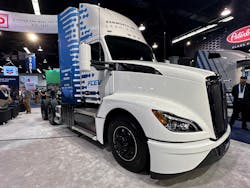Kenworth unveils T680 hydrogen fuel-cell commercialization plans
ANAHEIM, California—Kenworth will begin production of its Class 8 zero-emission T680 hydrogen fuel-cell electric vehicle (FCEV), powered by Toyota fuel-cell technology, the OEM announced here at the Advanced Clean Transportation Expo.
Initial customer deliveries are planned for 2024, with serial production planned in 2025. Kenworth dealers in the United States and Canada are now accepting deposits for the first of these T680 FCEV builds.
Kenworth and Toyota Motor North America collaborated on developing the T680 FCEV. Kenworth integrated Toyota’s latest advancements in hydrogen fuel-cell technology into its flagship T680 on-highway truck. The T680 FCEV has a range of up to 450 miles, depending upon driving conditions.
“The T680 FCEV was engineered to offer one of the longest driving ranges of any zero-emission trucks on the market,” said Kevin Baney, Kenworth general manager and Paccar VP. “With quick refueling, this broadens our zero-emission product offering to include round-the-clock operations in regional haul and demonstrates FCEV potential for long haul.”
See also: Kenworth, Toyota tout Class 8 fuel-cell EV capabilities
The truck is equipped with Toyota’s 310kW Dual Motor Assembly, capable of providing 415 horsepower continuously at a maximum payload of 82,000 lb. gross combined weight rating, and the Toyota Gen 2 Dual Fuel Cell Module.
Last year, Kenworth and Toyota completed a joint pilot program at the Port of Los Angeles, where Kenworth customers operated 10 prototype T680 FCEVs in a real-world setting. The program’s success laid the foundation for Kenworth and Toyota engineers to develop the T680 FCEV that is the focus of the commercialization plans.
During a May 2 keynote, John Rich, VP and chief technology officer for Paccar, said with four different fleets, Paccar put real-world miles on these trucks.
“We are excited to be a leader in this technology as hydrogen possesses the best zero-emission technology solutions for long-distance Class 8 trucks where range, weight capacity, and refueling downtime are critical,” Rich said.
“Just to be clear, this is not a highlight, this is not an experiment, or a try,” he added. “We’ve done all that. This is a tool that is ready to go to work, purchased, deployed, and supported with all the durability and uptime expectations of a diesel engine.”
About the Author

Cristina Commendatore
Cristina Commendatore is a past FleetOwner editor-in-chief. She wrote for the publication from 2015 to 2023.
